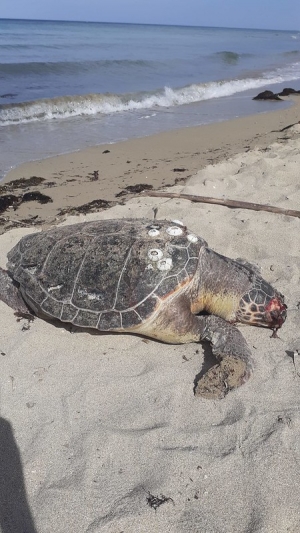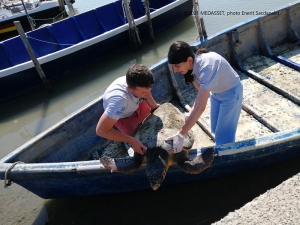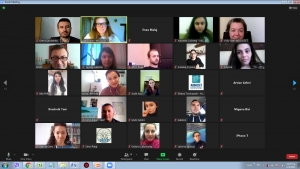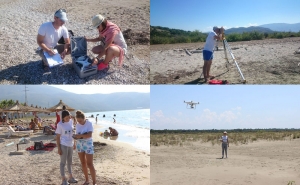PRESS RELEASE: Experts meet to discuss sea turtle stranding network in Albania
An online meeting was held on 4 November 2021 among Albanian experts and officials, within the framework of the project “Conservation of marine turtles in the Mediterranean Region”.
Important sea turtle populations feed and overwinter in Albania’s coastal waters, while in 2018 the first officially confirmed hatched nest was recorded.
The aim of the online meeting was to discuss the setup of an official network of experts and officials that will monitor Albania’s coasts for injured or dead sea turtles, also known as strandings. The meeting is part of project activities in Albania, which are being implemented by MEDASSET in collaboration with Dr. Enerit Sacdanaku, with funding from the MAVA Foundation.
The meeting started with opening remarks from Lobna Ben Nakhla of the UN Barcelona Convention’s Regional Activity Centre for Specially Protected Areas (RAC/SPA) who noted that the development of stranding networks and harmonised data collection is a priority under the “Action Plan for the Conservation of Mediterranean Marine Turtles” and welcomed Albania’s efforts towards this goal.
Elvana Ramaj of the Ministry of Tourism & Environment during her welcome speech, reaffirmed Albania’s commitment to marine turtle conservation and expressed support towards the importance of establishing a stranding network of officials and experts to monitor sea turtle strandings in the country.
Marine turtle expert Dr. Flegra Bentivegna (National Research Council, Italy) who is advising the process, presented the cases of Malta, Italy, Tunisia and France and provided guiding principles for a successful stranding network: officialisation, coordination, national coverage, harmonised protocols, shared and public data, trained and certified membership, well-equipped rehabilitation centers.
Albanian sea turtle expert, Dr. Enerit Sacdanaku presented the current monitoring in Albania and stressed the importance of establishing a National Sea Turtle Stranding Monitoring Network, which will regularly collect data on dead or injured turtles found along the Albanian coast.
The proposal on a National Sea Turtle Stranding Monitoring Network was presented in detail and discussed among the meeting participants, which included Ermal Halim of the Ministry of Tourism and Environment, Antonela Cobanaj and Migena Bici of the National Agency for Protected Areas and representatives of the Regional Agencies of Protected Areas: Shkodra (Agim Dardha), Lezhe, Durrës (Dude Kau, Halim Ҫelmanaj); Vlorë (Artion Seferi, Tatjana Mehillaj, Endora Celohoxhaj); Fier (Ervin Allushi). Prof. Dr. Ferdinand Bego of the University of Tirana, Assoc. Prof. Dr Hajdar Kicaj and Bledar Pepa of the University of Vlora, representatives of the UNDP (Labrina Bedinaj) and of NGOs “Social Education & Environment Protection”(Simo Ribaj), “Herpetofauna Albanian Society” (Enea Dama), Institute of Nature Conservation in Albania (Genti Kromidha) and “Protection and Preservation of Natural Environment in Albania” (Sabina Cano) participated in the discussions and provided valuable input and suggestions, while reaffirming their support towards the creation of an official network.
The meeting agreed to further deliberate on the proposal which provides the structure, procedures, requirements, roles and protocols to be followed, as well as an action plan for materializing the network in the long-term. Once the consultation process is completed the proposal will be delivered to the Ministry of Tourism and Environment. MEDASSET called on all interested individuals and organizations to communicate their willingness to support and participate in the network.
MEDASSET and Dr. Sacdanaku warmly thanked all participants and especially the Ministry of Tourism and Environment, the National Agency for Protected Areas and the representatives of the Regional Agencies of Protected Areas for their keen interest and collaboration .
Photos: https://www.flickr.com/photos/80147709@N07/albums/72157720117693303>
Contact: Dr. Enerit Sacdanaku, Zoologist (Herpetologist), Research Center of Flora and Fauna, Faculty of Natural Sciences, University of Tirana. Email: This email address is being protected from spambots. You need JavaScript enabled to view it.
About the Project: www.medmarineturtles.org and www.medasset.org/portfolio-item/conservation-of-marine-turtles-in-the-mediterranean-region
Notes to Editors:
[1] The project “Conservation of Marine Turtles in the Mediterranean Region”(2017-2022( is funded by the MAVA Foundation and is implemented in thirteen Mediterranean countries (Greece, Turkey, Albania, Algeria, Egypt, Morocco, Libya, Lebanon, Cyprus, Tunisia, Italy, Spain and France) by nine direct partners: ARCHELON , DEKAMER, National Marine Park of Zakynthos , MEDASSET, MedPAN, SPA/RAC , WWF Greece, WWF North Africa, WWF Turkey.
[2] Three of the seven species of sea turtles are found in the Mediterranean. The loggerhead (Caretta caretta) and green turtles (Chelonia mydas) nest here, and the huge leatherback (Dermochelys coriacea) is an occasional visitor. All species are included in the IUCN Red list of threatened species. Sea turtles are cold-blooded, air breathing, egg laying reptiles that spend their mysterious lives at sea but return each summer to the same area they were born to deposit their eggs in the sand. They take 20-30 years to mature and may live up to 100 years. Despite having travelled the world's seas since the age of the Dinosaurs, their survival is threatened due to coastal development, pollution, collision with vessels, fisheries and climate change. Each summer sea turtles lay their eggs on sandy beaches in the east and south regions of the Mediterranean basin (mainly Greece, Turkey, Cyprus, etc).
[3] With roots back to 1983, MEDASSET was founded in 1988 in the UK and in 1993 in Greece. It is an international NGO registered as a not-for profit organisation in Greece. MEDASSET plays an active role in the study and conservation of sea turtles and their habitats throughout the Mediterranean, through scientific research, environmental education, advocacy and awareness raising. The organisation is a partner to the United Nations Environment Programme’s Mediterranean Action Plan (UNEP/MAP) and a Permanent Observer-Member to the Bern Convention, Council of Europe, since 1988.
MEDASSET has implemented the “Rapid Assessment Survey of important marine turtle and monk seal habitats in the coastal area of Albania” in 2005 and the project “Monitoring and Conservation of Important Sea Turtle Feeding Grounds in the Patok Area of Albania” during 2008-2010. Subsequently, in 2011, in close collaboration with the Ministry of Environment, MEDASSET prepared “Management Recommendations for Drini Bay” and the “Action Plan for the Conservation of Sea Turtles and their Habitats in Albania” which was adopted by the Minister of Environment in 2012.
read more






